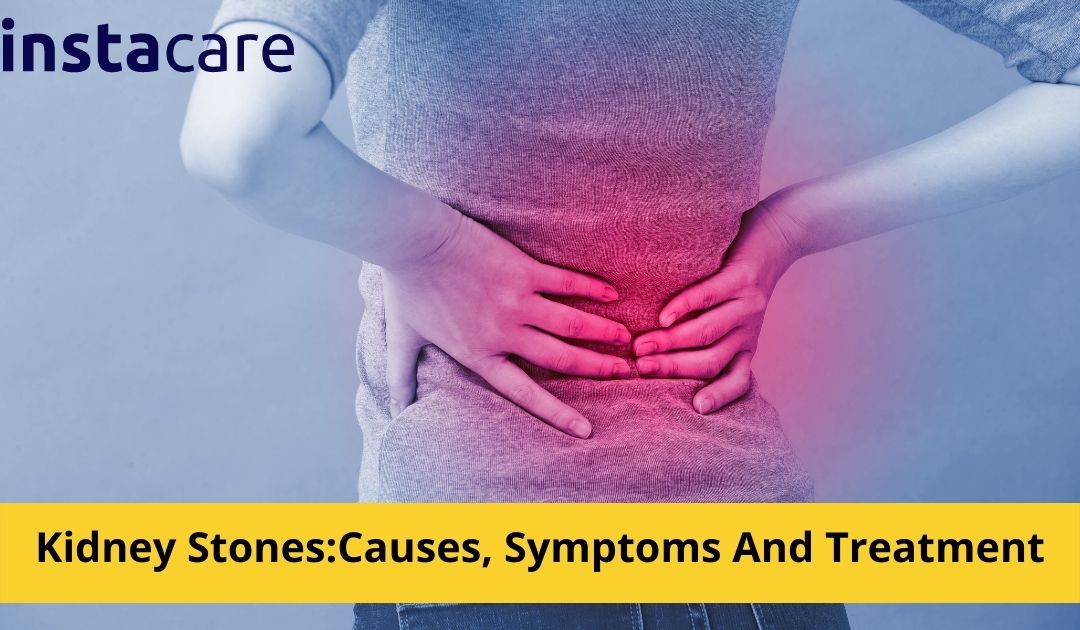A kidney stone is a solid mass of irregular shape or crystal in your kidney that can be small like grain and up to the size of a golf ball. For the time being, you don't even realize that there is a stone in your kidney, which is very painful. The stone is a complex object formed by the concentration of chemicals in your urine.
There are many complications regarding the stone in the kidney because the size of the stone is large, then it might trap in the ureter, causing the blockage of urine and even bleeding. The percentage of people suffering from kidney stones increases each year. The risk of kidney stones is higher in men, around 11% than in women, 9%. This problem may be triggered by other diseases like obesity and high blood pressure.
Causes Of Kidney Stones
The function of the kidney is to filter the blood, eliminate an extra amount of water from the body, and produce urine. This urine travels through both kidneys, which contain many dissolved chemicals. Sometimes, the accumulation of these chemicals in urine forms stones. These stones vary in size. The tiny rocks flushed out with urine, and others stuck in the ureter.
Many causes form kidney stones like drinking less water, too much exercise, weight loss surgery, too much salt or sugar, etc.
Symptoms Of Kidney Stones
If you have a small kidney stone, there might not be any symptoms if your stone is smaller and can easily pass through the urinary tract. But if your kidney stones are larger and have symptoms like;
Severe Pain In The Back And Belly
Kidney stone pain, also called renal colic - is one of the most severe pain. Specific individuals who've encountered kidney stones contrast the aggravation with labor or getting cut with a blade. The pain is sufficiently extreme that you have to visit the emergency room.
Typically, the pain begins when a stone moves in the right ureter. This causes a blockage, which makes pressure develop in the kidney. The strain enacts nerve fibers that transfer pain signs to the part of the brain.
Pain frequently goes back and forth in waves, which is unbearable by the ureter contracting as it attempts to push the stone out. Each wave might keep going for a couple of moments, vanish, and return once more.
Larger stones can be more complex than little ones. However, the seriousness of the pain isn't guaranteed to connect with the size of the stone. Indeed, even somewhat stone can be burdensome as it moves or causes a blockage.
View More: How Can My Kidney Stone Remove Through Remedies
Frequent And Urgent Need To Go
Expecting to go to the washroom more critically and frequently than expected is one more sign that the stone has moved down into the lower part of your urinary lot. You might wind up rushing to the washroom or hoping to go continually throughout. Urinary urgency can likewise copy a UTI side effect.
Blood In Urine
Blood in the urine is a typical sign in individuals with kidney stones. This symptom is likewise called hematuria.
The blood can be red, pink, or brown. Now and again, the platelets are too small even to consider seeing without a magnifying instrument (called minuscule hematuria). However, your physician can test your urine to check whether it contains blood.
Minor Urination At A Time
Large kidney stones slowly move in a ureter. This blockage can slow or stop the progression of urine flow.
Assuming you have a blockage, you may urinate somewhat each time you go. a urine stream that stops altogether is a health-related emergency.
Vomiting And Nausea
It's normal for individuals with kidney stones to have vomiting and nausea. These symptoms happen due to divided nerve associations among the kidneys and the GI plot. Stones in the kidneys can set off nerves in the GI lot, setting off an upset and unhealthy stomach.
Nausea and retching can likewise be your body's approach to responding to tremendous pain.
Treatment Of Kidney Stones
There are various ways to treat kidney stones. Sometimes only medications can be effective, or sometimes surgery is needed. Other treatments are ureteroscopy, shockwave lithotripsy, and nephrolithotripsy, which can cure or treat kidney stones.
Concluding It
Kidney stones are becoming more common because of our diet problems and variation. We are consuming too much salt in our diet that causes calcium accumulation in a ureter or drinking too little water that does not wash away the chemicals from the kidney.
Please book an appointment with the Best Nephrologist in Lahore, Karachi, Islamabad, and all major cities of Pakistan through InstaCare, or call our helpline at 03100002273 to find the verified doctor for your disease.







